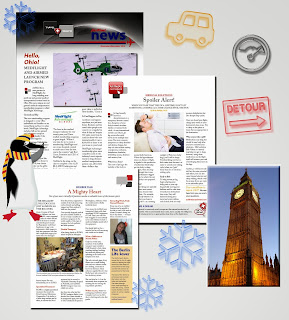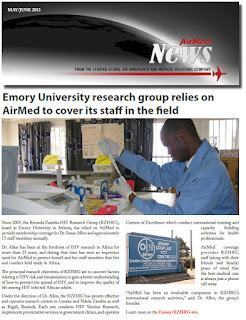AirMed Advises About Heat Stroke and Related Illness
Heat-related illnesses are a spectrum
of disorders ranging from relatively benign heat cramps to potentially lethal
heat stroke. These are due to
environmental heat exposure, when the body’s ability to cool itself through its
usual mechanisms (i.e. sweating, radiation) is overwhelmed.
 HEAT CRAMPS, EXHAUSTION
HEAT CRAMPS, EXHAUSTION
Heat cramps are very painful muscle cramps, usually in the
legs, that occur during exercise. These
are usually resolved with rest, cooling off, and replacing fluids and
electrolytes. Heat exhaustion is a bit
more severe, and may be considered a precursor to heatstroke. Symptoms include heavy sweating, rapid
breathing and a fast, weak pulse. In
this case, the victim should be moved to a cool area (indoors, or at least in
the shade) and clothing removed to promote heat loss (passive cooling).
Active cooling methods such as a fan and cold compresses to
the torso, had, neck and groin will help significantly. Again, fluids and electrolytes should be
given. Water alone may suffice in mild
cases (heat cramps), but sports beverages such as Gatorade G2 or Pedialyte are
preferred for more significant heat injuries.
Thirst is NOT a reliable indicator for the need for rehydration.
HEAT STROKE
Heat stroke is a medical emergency, and if untreated can
lead to significant neurological damage or death.
This occurs when the body’s ability to regulate core temperature has
been completely compromised, and body temperatures may exceed 40.6 °C (105.1 °F). One of the hallmark signs of heat stroke is a
change in mental status, such as confusion, slurred speech, or
unconsciousness.
Do NOT rely on the “lack of sweating” sign – that is not
always true! If someone is demonstrating
signs of heat stroke, do not give them anything to eat or drink (they may
aspirate these if they are semi-conscious), but do start other cooling measures
while you are otherwise calling EMS or seeking medical care.
BEST TREATMENT
The best treatment for heat related illnesses is to prevent
them from happening. During the warmer
months, reduce your risk by observing precautions to avoid overheating and
dehydration. Light, loose-fitting clothing will allow perspiration to evaporate
and cool the body. Wide-brimmed hats in light colors keep the sun from warming
the head and neck and block the powerful radiation from hurting the eyes; vents
on a hat will allow perspiration to cool the head.
Strenuous exercise should be avoided during daylight hours
in hot weather, as well as remaining in enclosed spaces without cooling or
ventilation. When the outside
temperature is 70 degrees Fahrenheit (21.1°C), the temperature inside the car
can exceed 120 degrees (48.8°C), even when the windows are partially open. NEVER leave children, elderly or disabled
adults, or pets alone in a vehicle!
Medications and substances that inhibit cooling and cause dehydration
such as alcohol, caffeine, stimulants, anti-cholinergics (i.e. for Parkinson’s
disease) predispose individuals to heat related injury and illness. Individuals at the extremes of age (younger
than 5, older than 65) are also at risk.
--Dr. Beth Phillips, MD, FACEP, FAWM, is AirMed's Director of Medical Operations and a regular contributor to this blog
Tintinalli, Judith (2004). Emergency Medicine: A
Comprehensive Study Guide (6th ed.). McGraw-Hill Professional. p. 1186. ISBN
0-07-138875-3.
Extreme Heat Guide, Centers for Disease Control and Prevention
(CDC)
For other ways to help save your life check out AirMed.com













